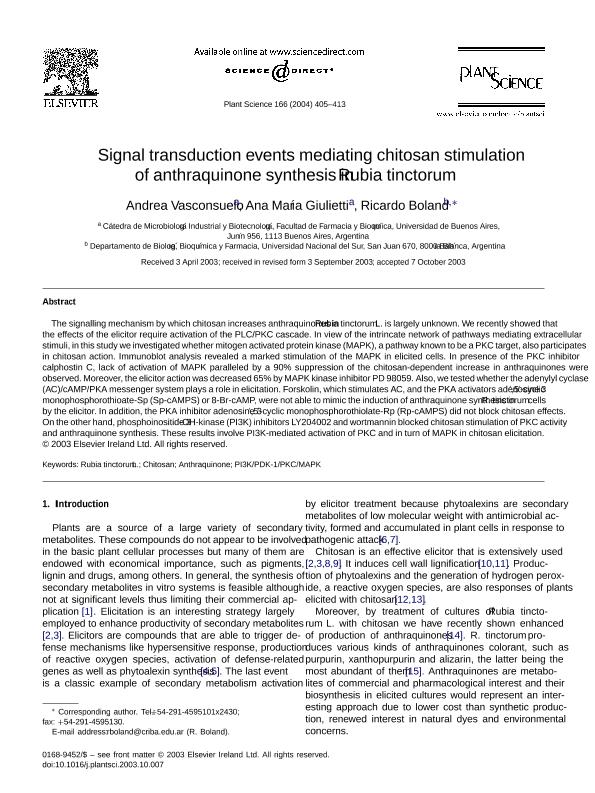Artículo
Signal transduction events mediating chitosan stimulation of anthraquinone synthesis in Rubia tinctorum
Fecha de publicación:
12/2004
Editorial:
Elsevier Ireland
Revista:
Plant Science
ISSN:
0168-9452
Idioma:
Inglés
Tipo de recurso:
Artículo publicado
Clasificación temática:
Resumen
The signalling mechanism by which chitosan increases anthraquinones in Rubia tinctorum L. is largely unknown. We recently showed that the effects of the elicitor require activation of the PLC/PKC cascade. In view of the intrincate network of pathways mediating extracellular stimuli, in this study we investigated whether mitogen activated protein kinase (MAPK), a pathway known to be a PKC target, also participates in chitosan action. Immunoblot analysis revealed a marked stimulation of the MAPK in elicited cells. In presence of the PKC inhibitor calphostin C, lack of activation of MAPK paralleled by a 90% suppression of the chitosan-dependent increase in anthraquinones were observed. Moreover, the elicitor action was decreased 65% by MAPK kinase inhibitor PD 98059. Also, we tested whether the adenylyl cyclase (AC)/cAMP/PKA messenger system plays a role in elicitation. Forskolin, which stimulates AC, and the PKA activators adenosine 3′,5′-cyclic monophosphorothioate-Sp (Sp-cAMPS) or 8-Br-cAMP, were not able to mimic the induction of anthraquinone synthesis in R. tinctorum cells by the elicitor. In addition, the PKA inhibitor adenosine 3′,5′-cyclic monophosphorothiolate-Rp (Rp-cAMPS) did not block chitosan effects. On the other hand, phosphoinositide 3′-OH-kinase (PI3K) inhibitors LY204002 and wortmannin blocked chitosan stimulation of PKC activity and anthraquinone synthesis. These results involve PI3K-mediated activation of PKC and in turn of MAPK in chitosan elicitation.
Palabras clave:
ANTHRAQUINONE
,
CHITOSAN
,
PI3K/PDK-1/PKC/MAPK
,
RUBIA TINCTORUM L.
Archivos asociados
Licencia
Identificadores
Colecciones
Articulos(CCT - BAHIA BLANCA)
Articulos de CTRO.CIENTIFICO TECNOL.CONICET - BAHIA BLANCA
Articulos de CTRO.CIENTIFICO TECNOL.CONICET - BAHIA BLANCA
Articulos(OCA HOUSSAY)
Articulos de OFICINA DE COORDINACION ADMINISTRATIVA HOUSSAY
Articulos de OFICINA DE COORDINACION ADMINISTRATIVA HOUSSAY
Citación
Vasconsuelo, Andrea Anahi; Giulietti, Ana Maria; Boland, Ricardo Leopoldo; Signal transduction events mediating chitosan stimulation of anthraquinone synthesis in Rubia tinctorum; Elsevier Ireland; Plant Science; 166; 2; 12-2004; 405-413
Compartir
Altmétricas




